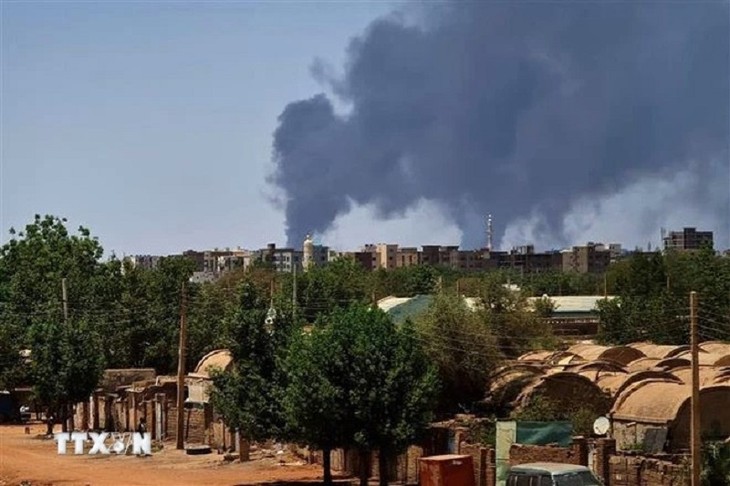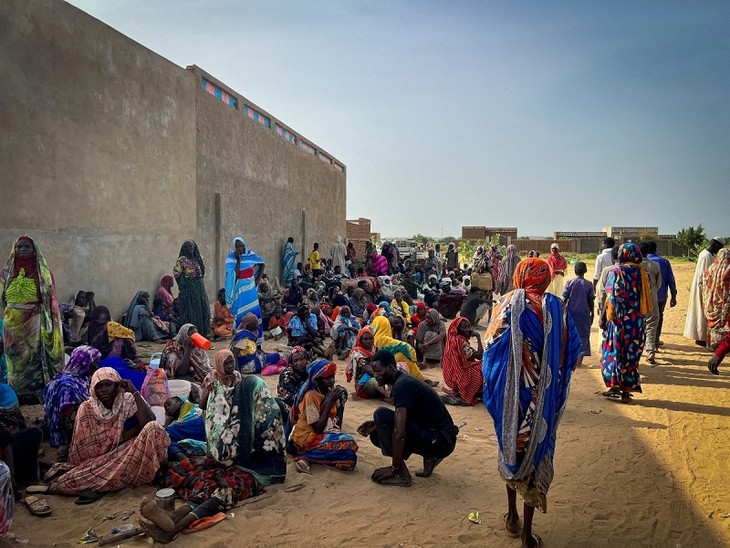(VOVWORLD) - April 15 marks one year of the conflict in Sudan. After a year, the African country is still bogged down in violence, creating a humanitarian tragedy for millions of people while the prospect of a peaceful solution remains elusive.
 Smoke rises from a clash in Khartoum, Sudan, on May 1, 2023. (File photo: AFP/VNA) Smoke rises from a clash in Khartoum, Sudan, on May 1, 2023. (File photo: AFP/VNA) |
The conflict in Sudan broke out on April 15, 2023, when the Sudanese army and the Rapid Support Forces (RSF) fought for control of the country. The confrontation began in the capital Khartoum and quickly spread to other localities.
Humanitarian crisis
The fight for power between two forces that were once allies drove Sudan into chaos and the economy and state institutions to the brink of collapse. According to UN data, the conflict has claimed the lives of 15,000 people and injured hundreds of thousands more. More than 8.5 million people have had to flee their homes, with some 1.8 million escaping to neighboring countries.
The World Health Organization says the health system in Sudan is collapsing. There is a serious shortage of medical staff and medical supplies. 70-80% of medical facilities have closed because of the fighting. Some states have not received medical supplies for a year.
The conflict has brought Sudan to a serious humanitarian crisis. On March 29, the UN's Integrated Food Security Phase Classification (IPC) estimated that 5 million Sudanese are severely malnourished, including 3.6 million children under 5 years old and 1.2 million pregnant and breastfeeding women. The IPC said that if hostilities do not immediately end and humanitarian assistance is not stepped up, about half of Sudan's population will be at risk of acute food insecurity and malnutrition from April to May.
Justin Brady, Director of the UN Office for the Coordination of Humanitarian Affairs (OCHA) in Sudan, said the tragedy is especially alarming for children.
“The war has been particularly hard on children. It’s estimated that 730,000 children are suffering from severe acute malnutrition. Without urgent assistance more than 200,000 children could die of starvation in the coming weeks and months.”
Humanitarian relief activities in Sudan face multiple challenges – endless fighting, an ineffective bureaucracy, and damaged infrastructure. Even worse, the crisis is spreading from Sudan to neighboring countries.
“Refugees escaped to Chad and South Sudan, two countries that have already extraordinarily fragile. Over 75% of the the population in South Sudan requires humanitarian assistance, and yet they have already received over 600,000 refugees, where the UN agencies and WFP are unable to meet all of their requirements,” Michael Dunford, WFP Regional Director for Eastern Africa, said.
 Refugees in a hospital in Adre, Chad. (Photo: Reuters) Refugees in a hospital in Adre, Chad. (Photo: Reuters) |
The forgotten conflict
Relief for ordinary people in Sudan has been neglected by the international community. UN humanitarian agencies say they need at least 2.7 billion USD this year to provide food, medical supplies, and other necessities to 24 million Sudanese people, nearly half of Sudan’s population. OCHA said at the end of March, however, that donors have only committed to providing 145 million USD to Sudan, just 5% of what it needs. Christos Christou, President of Doctors Without Borders, said the international community's ignorance of Sudan is shocking and unacceptable, because Sudan is experiencing the largest humanitarian crisis in the world.
International efforts to end the conflict and find a political solution for Sudan are going nowhere. At the latest UN Security Council meeting on Sudan in early March, the participants failed to reach a feasible solution beyond simply calling for an end to the fighting. Countries criticized each other for getting involved in the conflict in Sudan only to complicate the situation.
“The conflict has made devastating toll of the people of Sudan and battling the unity of the country. It could ignite regional instability of dramatic proportions from the Sahel to Horn of Africa and the Red Sea,” said UN Secretary General Antonio Guterres.
In the short term, the conflict in Sudan is directly threatening its relations with South Sudan, the country that split off from Sudan more than a decade ago. The wave of refugees from Sudan has put great pressure on South Sudan and caused instability at the border between the two countries, while the fighting has destroyed economic cooperation activities, including the oil pipeline from South Sudan across Sudan to a port on the Red Sea.
Observers warn that if the conflict in Sudan continues, the two countries could return to a state of hostility that would push the region into even greater chaos.